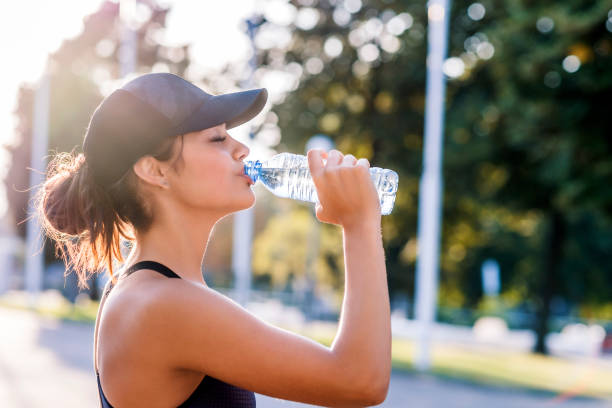Drinking water is critical to stay hydrated for good health and well-being, but many people do not drink enough fluids daily.
Water makes up over 60% of the human body, covering roughly 71% of the planet’s surface.
The 8-ounce rule suggests you drink eight 8-ounce (237-mL) glasses of water daily.
Although there is little to no science behind this particular rule, it is critical to stay hydrated.
The omnipresent nature of water may mean that getting enough water each day isn’t at the top of many people’s priority lists.
All of the body’s cells and organs require water to function properly.
Water is a nutrient that your body needs, and it can be found in drinks, plain water, and foods.
All of these are required regularly to replace the vast volumes of water lost during the day.
Skin evaporation, breathing, urine, and stool cause fluid loss, which must be supplied daily for optimal health.
You can become dehydrated if your water intake does not match your outflow.
Fluid losses are exacerbated in hotter climes, during hard exercise, at high elevations, and in older people with a less acute sensation of thirst.
Reasons You Should Be Drinking Water Regularly
Here are nine reasons to make sure you’re drinking enough water or other fluids every day:
Drinking Water Prevents You From Becoming Dehydrated
When you exercise vigorously, sweat profusely in hot weather, get a fever, or get an illness that causes vomiting or diarrhoea, your body loses fluids.
If you’re losing fluids to any of these causes, boosting your fluid intake is critical to rehydrate your body to its natural level.
According to your doctor, other health conditions, such as bladder infections and urinary tract stones, may require you to drink more fluids.
Innovative Tech Solutions, Tailored for You
Our leading tech firm crafts custom software, web & mobile apps, designed with your unique needs in mind. Elevate your business with cutting-edge solutions no one else can offer.
Start NowIf you’re pregnant or nursing, talk to your doctor about how much water you should drink because your body will need more than usual, especially breastfeeding.
Read: Why is Good Hygiene Essential for Health?

Drinking Water Aids in Digestion
Water is necessary for proper digestion.
It aids in the breakdown of food, allowing nutrients to be absorbed by your body.
Both your small and large intestines absorb water when you drink, which then enters your bloodstream and is utilised to break down nutrients.
Stool transforms from liquid to solid as the large intestine absorbs water.
Water is also required to aid in the digestion of soluble fibre.
Read: Dispelling Myths About the Science of Weight Loss
Water Keeps Your Cardiovascular System Healthy
Your blood is mostly made up of water.
Plasma, for example, is around 90% water and is your blood’s pale yellow liquid element.
When you’re dehydrated, your blood gets more concentrated, which might cause an electrolyte mineral imbalance, such as sodium and potassium.
Electrolytes are required for normal muscle and cardiac function.
Standing up can make you feel light-headed or woozy due to dehydration, which lowers blood volume and, hence, blood pressure.
Read: How Your Gut Health Contributes to Weight Loss
It Regulates Body Temperature
When the body heats up, water held in the middle layers of the skin rises to the surface as perspiration.
It cools the body as it evaporates.
Some scientists believe that heat storage increases when the body has too little water, and the individual’s ability to handle heat stress decreases.
If heat stress occurs during exercise, a large amount of water in the body may help to alleviate physical strain.
Read: Staying Hydrated: Tips for Better Athletic Performance
It Helps You Slim Down
Water is beneficial to the body in a number of ways.
Drinking cold water boosts your metabolism and can help you lose weight.
After consuming cold water, the body must invest extra energy to raise its temperature.
You will burn more calories as a result of this.
For eight weeks, overweight young women were told to drink around 2 cups of cold water half an hour before breakfast, lunch, and dinner.
Seamless API Connectivity for Next-Level Integration
Unlock limitless possibilities by connecting your systems with a custom API built to perform flawlessly. Stand apart with our solutions that others simply can’t offer.
Get StartedThe women lost weight, had a reduced BMI, and had improved body composition scores by the end of the trial.
Water is also a fantastic substitute for sugary and calorie-dense beverages like soft drinks and juice.
To help your waistline, replace these beverages with chilled water.
Drinking Water Fights Fatigue
Mild dehydration has a detrimental impact on one’s mood and energy.
The majority of the body’s functions are affected by dehydration.
Dehydration has been linked to increased fatigue, hostility, and confusion, as well as mood issues and decreased vitality.
For your cells to function correctly, you must stay hydrated.
Water also aids in the maintenance of a healthy heart rate and blood pressure.
You need enough fluid to create lymph, a vital physiological fluid and component of the immune system.
In a water-rich environment, all of the body’s systems function better.
To avoid dehydration, drink plenty of water throughout the day.
You’re probably already dehydrated if you wait till you’re thirsty.
If plain water does not appeal to you, try lemon water.
Drinking Water Boosts Skin Health
Drinking enough water helps skin cells plump up, reducing the appearance of fine lines and wrinkles and making you look younger.
Water also aids in detoxification and aids in the removal of toxins and impurities from the body, which can dull your complexion.
Keep yourself hydrated to promote healthy circulation and blood flow, making your skin glow.
If you don’t like the flavour of plain water, try adding a few drops of lemon juice.
Citrus fruits include vitamin C, an antioxidant that fights skin-damaging free radicals and promotes the health of collagen, a key component of the skin.
To improve skin health, drink enough water and eat fruits and vegetables high in polyphenols and flavonoids.
Drinking Water Benefits Your Kidneys
Kidney stones are becoming increasingly common.
Preventing the production of stones can be as simple as staying hydrated.
Salts and minerals that would normally concentrate in the kidneys and form stones are diluted by water.
The kidneys are responsible for maintaining water levels, regulating blood pressure, and filtering waste.
The pH of urine influences kidney stone formation.
Transform Business with Custom CRM & ERP Solutions
Elevate your operations with a CRM or ERP tailored for you. Let’s build the perfect solution that others can't replicate—crafted to match your business's needs like no other.
Get StartedSome forms of stones are made to form by acidic urine, whereas others are formed by alkaline pee.
The use of citric acid and calcium citrate prevents kidney stones.
Your urine should have a pale-yellow tint if you consume enough water to keep your kidneys healthy.
Moreover, you may be dehydrated if your skin is darker.
You may be over-hydrated if it is colourless.
It Helps You Work Out Better
Being properly hydrated is important while working out.
Drinking water allows you to exercise for longer periods while avoiding muscle cramps.
Water aids in the lubrication of the body’s joints.
The amount of water you need to drink when exercising is determined by several factors, including your weight, the amount of perspiration you produce, your degree of activity, and the weather.
While exercising, though, a reasonable rule of thumb is to drink 5 to 10 ounces of water every 15 to 20 minutes.
Finally, drink roughly 2 cups of water every 2 hours before exercising to stay hydrated during your workout.

Tips to Help You Drink More Water
If you believe you need to drink more water, try the following suggestions to boost your fluid consumption and reap the advantages of water:
- You can also set reminders to drink more water using an app or the alarm on your smartphone or smartwatch.
- Drink water with every snack and supper.
- You can spice up the taste of your water with a bit of lemon juice, vitamin C powder or whatever you want. It’s only natural for you to want to drink more of what you like.
- Increase your intake of fruits and vegetables. Their high water content will aid your hydration. Foods account for about 20% of our fluid intake.
- Keeping a bottle of water in your car, at your desk, or in your luggage is a good idea.
- Focus on fluids. You don’t have to drink plain water to meet your hydration needs. Other good sources of hydration include milk, tea, and broth.
Conclusion
In conclusion, staying hydrated is essential for overall health and well-being.
Water plays a vital role in digestion, circulation, temperature regulation, and even weight management.
So, making a conscious effort to drink enough fluids can prevent dehydration and boost your energy levels.
It can also support your body’s vital functions.
Simple strategies like carrying a water bottle, incorporating more fruits and vegetables into your diet, and choosing water over sugary drinks can help you maintain proper hydration.
Remember, staying hydrated isn’t just about drinking water—it’s about prioritizing hydration for a healthier, more vibrant life.
Before You Go…
Hey, thank you for reading this blog post to the end. I hope it was helpful. Let me tell you a little bit about Nicholas Idoko Technologies.
We help businesses and companies build an online presence by developing web, mobile, desktop, and blockchain applications.
We also help aspiring software developers and programmers learn the skills they need to have a successful career.
Take your first step to becoming a programming expert by joining our Learn To Code academy today!
Be sure to contact us if you need more information or have any questions! We are readily available.











